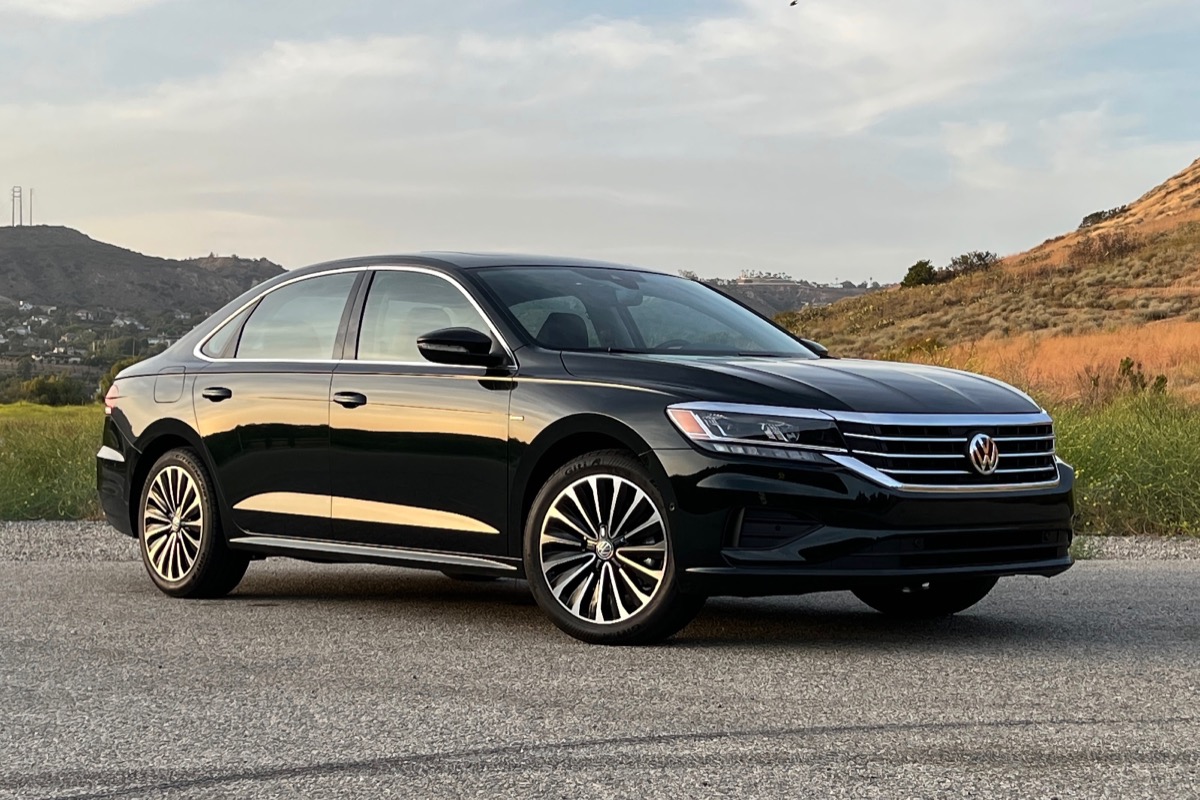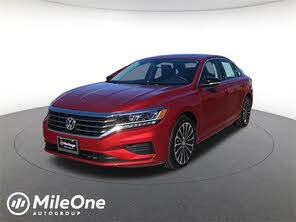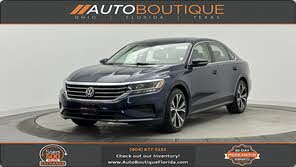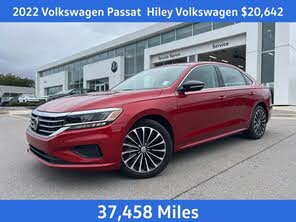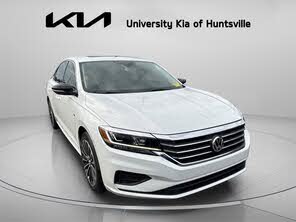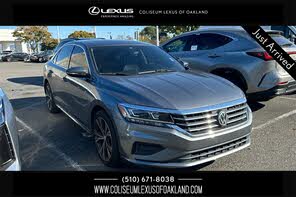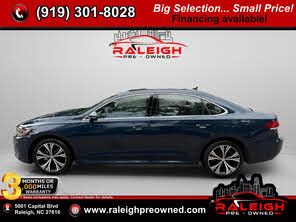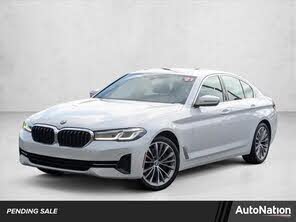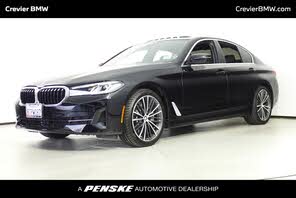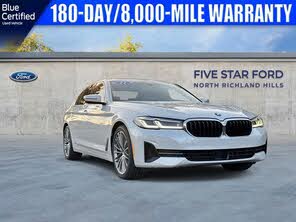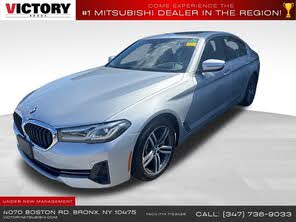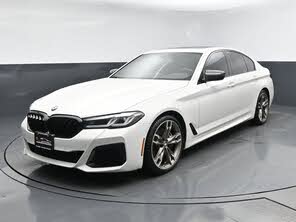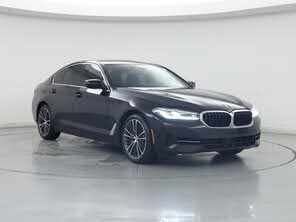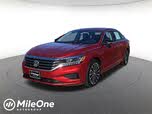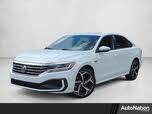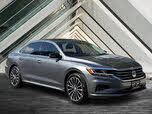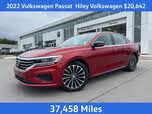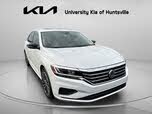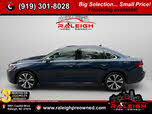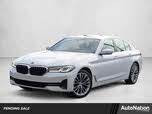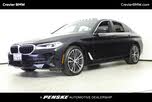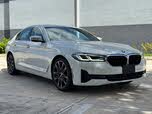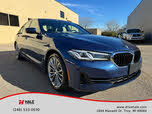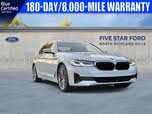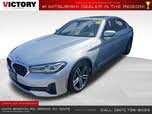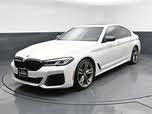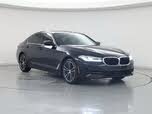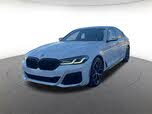2022 Volkswagen Passat vs 2021 BMW 5 Series
Overview | |
MSRP$54,200 | MSRP$27,575 |
Listings295 | Listings218 |
Ratings & Reviews | |
User Reviews | User Reviews |
Expert reviews8.0 out of 10 | Expert reviews6.0 out of 10 |
Pros
Cons
| Pros
Cons
|
2021 BMW 5 Series Reviews SummaryBMW was once known for sports sedans, and the 5 Series was one of the most prolific of those sedans. Sitting between the 3 Series and 7 Series in size and price, previous generations of 5 Series were known for a balance of performance and luxury, with impeccable engineering throughout. Today, the BMW 5 Series is largely irrelevant. The 3 Series is now so big that there is less reason to upgrade, and most buyers are more interested in SUVs anyway. The competition—including the Audi A6, Jaguar XF, Mercedes-Benz E-Class, and Volvo S90—has also gotten better. That doesn’t mean BMW has given up on the 5 Series. The current generation (codename G30) arrived for the 2017 model year, but it gets a midcycle refresh (or LCI, short for “Life Cycle Impulse,” in BMW speak) for 2021. Major updates include a 48-volt mild-hybrid system, a bigger infotainment touchscreen, and subtle styling changes. The 2021 BMW 5 Series is not like the 5 Series models of old. That may drive away hardcore car fans, but the 2021 model makes a strong case to new-car buyers, maintaining sportier-than-average driving dynamics, along with the tech and luxury features expected of a car in this segment. | |
2022 Volkswagen Passat Reviews SummaryFirst came the Dasher in 1974, then the Quantum in 1982, then the Passat in 1990. None became household names like the Honda Accord or Toyota Camry, partly because the Passat and its progenitors appealed to a small contingent of Americans seeking European design, engineering, and driving dynamics in a car often characterized as a bargain-priced Audi. But in the midsize sedan segment, a reputation for reliability and efficiency, not design or handling, is king. Tired of compromise, Volkswagen "Americanized" the Passat for the 2011 model year, moving production to a new factory in Chattanooga, Tennessee. The car's blandly attractive design, huge interior, big trunk, and soft ride seemed to be just what U.S. customers wanted, along with a ”Made in the USA” label. But those potential buyers had moved on to SUVs, and the new Passat alienated some of the VW faithful. The Dieselgate scandal didn't help the Passat, either. VW nailed the car's coffin shut when the family car segment began to wither rapidly. So now, the Passat departs the U.S. market, effectively replaced by the Tiguan and Atlas SUVs and leaving the Jetta to serve people who still want a sedan wearing a VW logo on its grille. | |
No video found | No video found |
Popular Features & Specs | |
Engine2.0L 248 hp I4 | Engine2.0L 174 hp I4 |
Drive TrainRWD | Drive TrainFWD |
Seating Capacity5 | Seating Capacity5 |
Horsepower248 hp @ 5200 rpm | Horsepower174 hp @ 5200 rpm |
MPG City25 | MPG City24 |
MPG Highway33 | MPG Highway36 |
Engine | |
Engine Name2.0L 248 hp I4 | Engine Name2.0L 174 hp I4 |
Torque257 lb-ft @ 1500 rpm | Torque206 lb-ft @ 1700 rpm |
Horsepower248 hp @ 5200 rpm | Horsepower174 hp @ 5200 rpm |
DrivetrainRWD | DrivetrainFWD |
Fuel Economy | |
MPG City25 | MPG City24 |
MPG Highway33 | MPG Highway36 |
Interior | |
Seating Capacity5 | Seating Capacity5 |
Key Features | |
Navigation SystemStandard | Navigation System |
Sunroof/MoonroofStandard | Sunroof/MoonroofStandard |
Safety | |
Front Crash Overall | Front Crash Overall3 |
Side Crash Overall | Side Crash Overall5 |
Dimensions & Capacity | |
Cargo Space14.0 cu ft | Cargo Space15.9 cu ft |
Curb Weight3765 lbs | Curb Weight3369 lbs |
Height58.2 in | Height58.7 in |
Length195.8 in | Length193.6 in |
Width83.7 in | Width72.6 in |
Wheelbase117.1 in | Wheelbase110.4 in |
Maximum Payload800 lbs | Maximum Payload937 lbs |
Number of doors4 | Number of doors4 |
Overview | ||
MSRP | $54,200 | $27,575 |
Listings | ||
Ratings & Reviews | ||
User reviews | ||
Expert reviews | 8.0 out of 10Read full review | 6.0 out of 10Read full review |
Pros & cons | Pros
Cons
| Pros
Cons
|
Summary | BMW was once known for sports sedans, and the 5 Series was one of the most prolific of those sedans. Sitting between the 3 Series and 7 Series in size and price, previous generations of 5 Series were known for a balance of performance and luxury, with impeccable engineering throughout. Today, the BMW 5 Series is largely irrelevant. The 3 Series is now so big that there is less reason to upgrade, and most buyers are more interested in SUVs anyway. The competition—including the Audi A6, Jaguar XF, Mercedes-Benz E-Class, and Volvo S90—has also gotten better. That doesn’t mean BMW has given up on the 5 Series. The current generation (codename G30) arrived for the 2017 model year, but it gets a midcycle refresh (or LCI, short for “Life Cycle Impulse,” in BMW speak) for 2021. Major updates include a 48-volt mild-hybrid system, a bigger infotainment touchscreen, and subtle styling changes. The 2021 BMW 5 Series is not like the 5 Series models of old. That may drive away hardcore car fans, but the 2021 model makes a strong case to new-car buyers, maintaining sportier-than-average driving dynamics, along with the tech and luxury features expected of a car in this segment. | First came the Dasher in 1974, then the Quantum in 1982, then the Passat in 1990. None became household names like the Honda Accord or Toyota Camry, partly because the Passat and its progenitors appealed to a small contingent of Americans seeking European design, engineering, and driving dynamics in a car often characterized as a bargain-priced Audi. But in the midsize sedan segment, a reputation for reliability and efficiency, not design or handling, is king. Tired of compromise, Volkswagen "Americanized" the Passat for the 2011 model year, moving production to a new factory in Chattanooga, Tennessee. The car's blandly attractive design, huge interior, big trunk, and soft ride seemed to be just what U.S. customers wanted, along with a ”Made in the USA” label. But those potential buyers had moved on to SUVs, and the new Passat alienated some of the VW faithful. The Dieselgate scandal didn't help the Passat, either. VW nailed the car's coffin shut when the family car segment began to wither rapidly. So now, the Passat departs the U.S. market, effectively replaced by the Tiguan and Atlas SUVs and leaving the Jetta to serve people who still want a sedan wearing a VW logo on its grille. |
Video | No video found | No video found |
Popular Features & Specs | ||
Engine | 2.0L 248 hp I4 | 2.0L 174 hp I4 |
Drive Train | RWD | FWD |
Seating Capacity | 5 | 5 |
Horsepower | 248 hp @ 5200 rpm | 174 hp @ 5200 rpm |
MPG City | 25 | 24 |
MPG Highway | 33 | 36 |
Engine | ||
Engine Name | 2.0L 248 hp I4 | 2.0L 174 hp I4 |
Torque | 257 lb-ft @ 1500 rpm | 206 lb-ft @ 1700 rpm |
Horsepower | 248 hp @ 5200 rpm | 174 hp @ 5200 rpm |
Drivetrain | RWD | FWD |
Fuel Economy | ||
MPG City | 25 | 24 |
MPG Highway | 33 | 36 |
Interior | ||
Seating Capacity | 5 | 5 |
Key Features | ||
Navigation System | Standard | |
Sunroof/Moonroof | Standard | Standard |
Safety | ||
Front Crash Overall | 3 | |
Side Crash Overall | 5 | |
Dimensions & Capacity | ||
Cargo Space | 14.0 cu ft | 15.9 cu ft |
Curb Weight | 3765 lbs | 3369 lbs |
Height | 58.2 in | 58.7 in |
Length | 195.8 in | 193.6 in |
Width | 83.7 in | 72.6 in |
Wheelbase | 117.1 in | 110.4 in |
Maximum Payload | 800 lbs | 937 lbs |
Number of doors | 4 | 4 |

By: CarGurus + AI
At CarGurus, our team of experienced automotive writers remain at the heart of our content operation, conducting hands-on car tests and writing insightful guides that are backed by years of industry experience. To complement this, we are harnessing AI to make our content offering more diverse and more helpful to shoppers than ever. To achieve this, our AI systems are based exclusively on CarGurus content, ratings and data, so that what we produce is both unique to CarGurus, and uniquely helpful to car shoppers.

